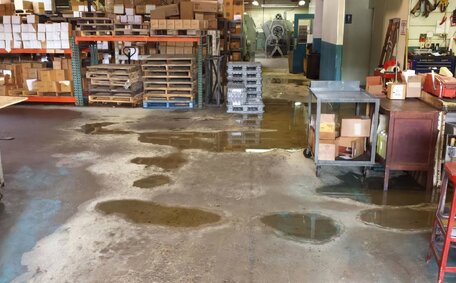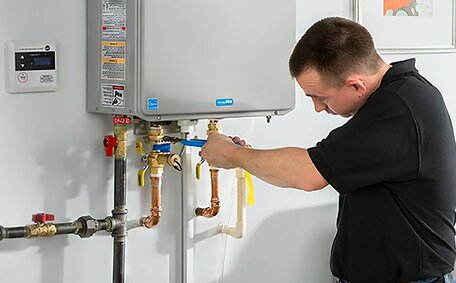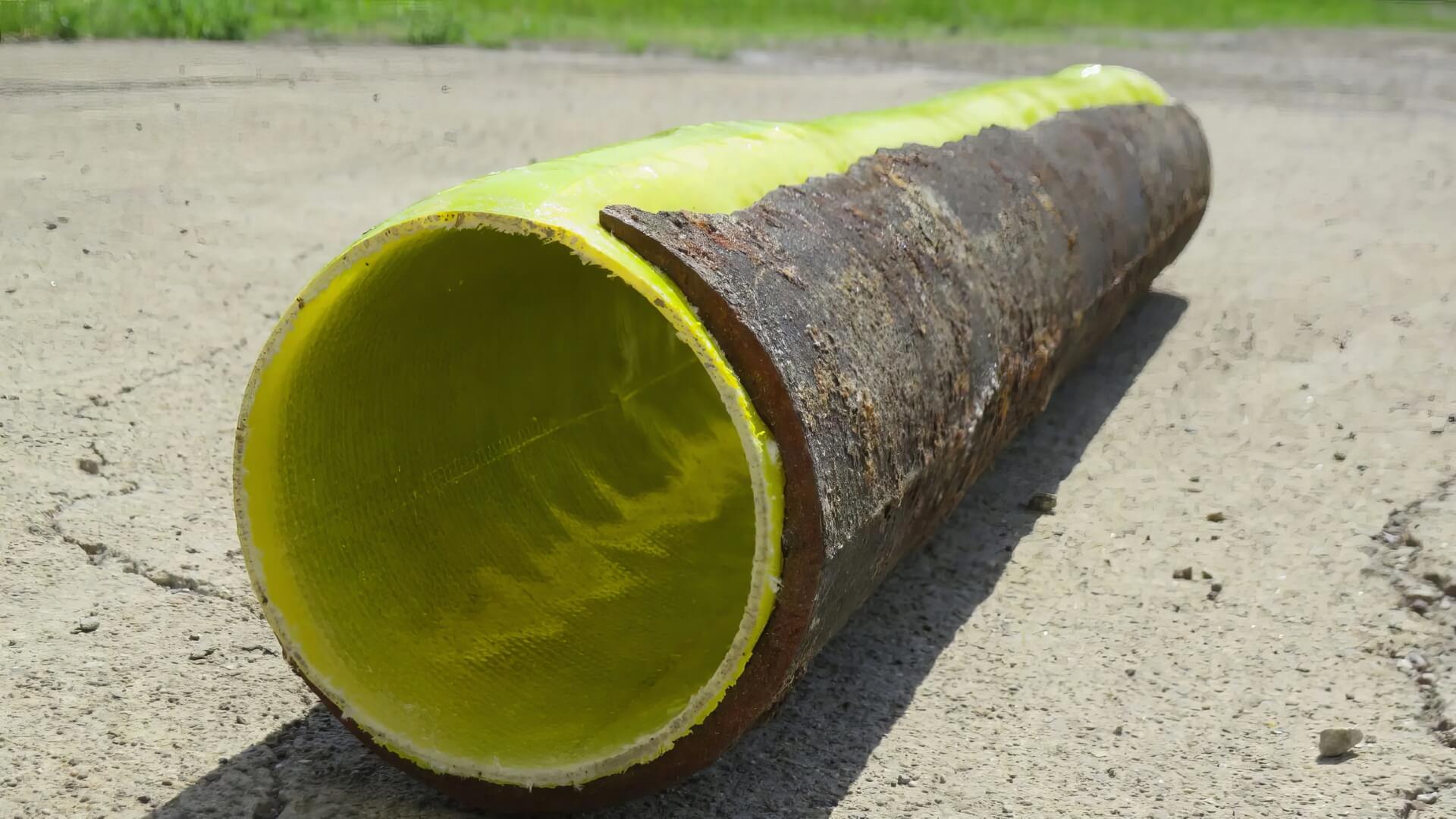
How To Fix Water Heater Issues
Can’t get hot water from your water heater? Try troubleshooting by checking the power supply, thermostat, heating elements and more. Call a pro plumber for repairs.
Read MoreTankless water heaters operate on-demand, heating water instantly as you turn on the tap. Unlike traditional hot water tank heaters, tankless systems do not retain heated water internally. Instead, these heaters employ high-powered elements that quickly heat water, eliminating the wait time.
Cold water from the inlet enters the tankless unit where the heat exchanger, powered by efficient gas burners or electrical elements, heats it. The system’s sensors detect the water flow and activate the heating elements, which then warm the water to the desired temperature. Once warmed, the water can then flow out of the system, offering hot water on demand.
Tankless heaters continuously provide hot water and rarely run out, provided the flow rate does not exceed the heater’s capacity. Traditional tank water heaters take longer to heat water but can supply multiple sources simultaneously without impacting temperature.
However, if demand for hot water exceeds the heater’s maximum flow rate, the water temperature will drop.
Natural gas tankless water heaters not only excel in efficiency but also offer higher flow rates, making them ideal for larger homes. Electric tankless water heaters, with their lower flow rates, are well-suited for smaller households. The technology equips tankless units to only heat water upon demand, curtailing standby heat losses linked with traditional tank heaters.
In summary, a tankless heater utilises high-powered burners or heating elements to rapidly heat water on demand rather than retaining hot water in a storage tank. By heating water as needed, tankless heaters increase efficiency and offer a continuous hot water supply within their flow rate limits.
There are several key advantages to choosing a tankless water heater over a conventional storage water heater model:
Tankless heaters offer an uninterrupted hot water supply, even during extensive use.
Tankless hot water systems deliver immediate hot water, avoiding standby energy losses typical of traditional storage water heaters. This leads to energy bill savings of up to 34% for homes that use 155 litres or less of hot water daily.
By eliminating the need for a bulky storage tank, tankless systems free up valuable space with their compact design. Their small size allows flexible installation in tight spaces.
When maintained correctly, premium tankless heaters can exceed 20 years of service, outlasting conventional tank-style water heaters. Their longevity is greater than traditional tank models, which offsets the higher initial cost.
Tankless heaters maintain a consistent water temperature, in contrast to storage tanks that may experience temperature instability.
By reducing standby heat loss and providing endless hot water on demand, energy-efficient tankless heaters demonstrate superior performance compared to standard storage tank models.
Carefully weighing the advantages and disadvantages of tankless water heaters is crucial to determine if they meet your specific needs:
The initial expense for a tankless water heater, including installation, is generally higher than that of a traditional storage tank model. Expect to pay $1000+ for the heater itself, plus higher installation fees for gas line modifications, upgraded electrical wiring or exhaust venting.
Tankless systems need a few seconds to heat the water as they do not store a hot water supply like storage tanks do. This results in a slight lag of up to 10 seconds before hot water flows from the faucet, potentially longer in larger homes.
Households with substantial hot water usage, exceeding 41 gallons per day, may find it challenging to save money with tankless models compared to conventional water heaters. Tankless water heaters might incur higher energy costs in homes with heavy usage despite generally being more efficient than traditional tanks.
Tankless heaters have intricate components that require specialised expertise to service. Annual maintenance is recommended to keep them operating efficiently. Neglected maintenance can be expensive if problems arise.
Simultaneous use of multiple hot water appliances may overwhelm a gas tankless heater’s flow rate, causing the water temperature to drop. Gas tankless models are designed with higher flow rates, better accommodating multiple appliances running at once.
Determining which water heater best combines ease and efficiency with a manageable cost and maintenance profile is key to ensuring your needs are met.
When considering a tankless water heater for your home, understanding your routine hot water usage is crucial. Carefully consider the following to see if upgrading to tankless makes sense for your household:
Tankless heaters are optimal for homes with daily water use of approximately 155 litres or less. Constant demands above their maximum flow rate can result in decreased output temperatures.
Tankless systems may not cope as well with simultaneous hot water demands as traditional tank heaters do. Large households may require a higher capacity gas tankless unit.
In colder regions, tankless water heaters can be beneficial, providing higher flow rates to offset chilly incoming water temperatures. Electric tankless can be less effective in frigid conditions.
The compact size of tankless heaters offers placement flexibility, allowing homeowners to save space even in confined areas. Make sure to consider service clearance requirements.
While increased efficiency may lead to cost savings over time, the initial investment for a tankless unit with installation often exceeds $1000. Can your budget accommodate the initial investment?
Explore available rebates and incentives through local and federal government programs when considering a switch to an energy-efficient tankless water heater.
Annual maintenance by qualified technicians is recommended to maintain peak efficiency of tankless heaters. This should be factored into operating costs.
Evaluating these factors will help you determine if a tankless system’s benefits such as continuous hot water, energy savings, and long-term durability justify the upfront and ongoing costs for your home.
Can’t get hot water from your water heater? Try troubleshooting by checking the power supply, thermostat, heating elements and more. Call a pro plumber for repairs.
Read MoreCloudy or milky hot water coming from your taps is generally harmless and caused by trapped air bubbles in the water. Simply running the tap for a little while will usually clear up the water. If the cloudiness persists, it could be caused by sediment buildup or issues with your pipes.
Read MorePipe relining involves inserting a tube inside damaged pipes to repair cracks and leaks without digging. This trenchless method may allow pipes and plumbing fixtures to be relocated during bathroom renovations. Contact our expert plumbers to understand if pipe relining can reposition your pipes and fixtures.
Read MoreBaulkham Hills, 2153 NSW
We will call back as soon as possible.




